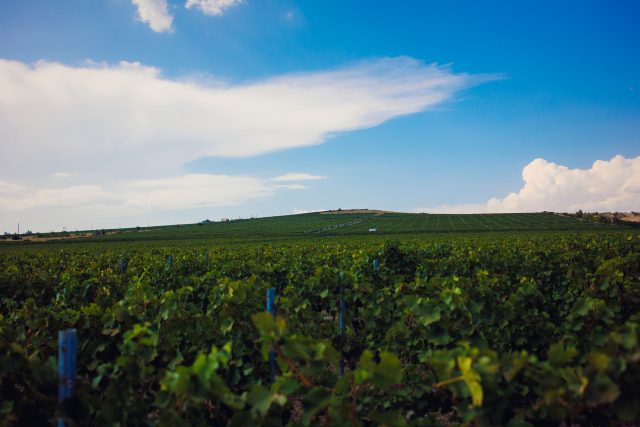The Romanian producer is marking a milestone as it achieved a zero-pesticide approach on 50% of its vines. The post Domeniile Alexandrion Rhein 1892 pivots from pesticides in 2023 appeared first on The Drinks Business.
The Romanian producer is marking a milestone as it achieved a zero-pesticide approach on 50% of its vines.

As 2023 closes, Domeniile Alexandrion Rhein 1892 is celebrating an important sustainable achievement. Since the beginning of the year, the winery, which is based in Romania’s Dealu Mare region, has used no pesticides on 50% of its vines. The work, part of a multi-year programme, began in 2022. By 2025, they intend to make 100% pesticide free wines.
Though sustainability in general is a key industry trend, pesticides have recently proved a particularly hot topic. A
new study in December claimed that pesticide residues in wines have risen dramatically, though
it was disputed by trade bodies. Meanwhile, scientists have established connections between pesticides exposure and conditions
such as Parkinson’s disease.
Domeniile Alexandrion Rhein 1892 has achieved its progress through a series of interventions and monitoring processes. George Barnotty, an agronomist who has been helping with the transition, described the ethos as “strengthening the plants and making them more resilient to pests”.
In practice, it has meant careful monitoring of the vineyards. The latest technology, including drones, is deployed to monitor growth and anticipate the plant's needs, while factoring in soil conditions and weather patterns. That strengthens the plant against potential threats and enables the vineyard team to make highly targeted interventions where necessary. The amount of data is impressive; even moonlight levels are analysed, as this can impact nocturnal insect activity.
Lorenzo Vergani, operations director at Alexandrion Group, was keen to emphasise that quality and sustainability can go hand in hand through the programme. “The health of our consumers and protecting the environment, which is aggressed by so many external factors, are our absolute priorities,” he explained. “Experience has proven to us that producing pesticide free wines while maintaining the same quality standards that we have accustomed our consumers with, is possible.”
View Entire Post
 As 2023 closes, Domeniile Alexandrion Rhein 1892 is celebrating an important sustainable achievement. Since the beginning of the year, the winery, which is based in Romania’s Dealu Mare region, has used no pesticides on 50% of its vines. The work, part of a multi-year programme, began in 2022. By 2025, they intend to make 100% pesticide free wines.
Though sustainability in general is a key industry trend, pesticides have recently proved a particularly hot topic. A new study in December claimed that pesticide residues in wines have risen dramatically, though it was disputed by trade bodies. Meanwhile, scientists have established connections between pesticides exposure and conditions such as Parkinson’s disease.
Domeniile Alexandrion Rhein 1892 has achieved its progress through a series of interventions and monitoring processes. George Barnotty, an agronomist who has been helping with the transition, described the ethos as “strengthening the plants and making them more resilient to pests”.
In practice, it has meant careful monitoring of the vineyards. The latest technology, including drones, is deployed to monitor growth and anticipate the plant's needs, while factoring in soil conditions and weather patterns. That strengthens the plant against potential threats and enables the vineyard team to make highly targeted interventions where necessary. The amount of data is impressive; even moonlight levels are analysed, as this can impact nocturnal insect activity.
Lorenzo Vergani, operations director at Alexandrion Group, was keen to emphasise that quality and sustainability can go hand in hand through the programme. “The health of our consumers and protecting the environment, which is aggressed by so many external factors, are our absolute priorities,” he explained. “Experience has proven to us that producing pesticide free wines while maintaining the same quality standards that we have accustomed our consumers with, is possible.”
As 2023 closes, Domeniile Alexandrion Rhein 1892 is celebrating an important sustainable achievement. Since the beginning of the year, the winery, which is based in Romania’s Dealu Mare region, has used no pesticides on 50% of its vines. The work, part of a multi-year programme, began in 2022. By 2025, they intend to make 100% pesticide free wines.
Though sustainability in general is a key industry trend, pesticides have recently proved a particularly hot topic. A new study in December claimed that pesticide residues in wines have risen dramatically, though it was disputed by trade bodies. Meanwhile, scientists have established connections between pesticides exposure and conditions such as Parkinson’s disease.
Domeniile Alexandrion Rhein 1892 has achieved its progress through a series of interventions and monitoring processes. George Barnotty, an agronomist who has been helping with the transition, described the ethos as “strengthening the plants and making them more resilient to pests”.
In practice, it has meant careful monitoring of the vineyards. The latest technology, including drones, is deployed to monitor growth and anticipate the plant's needs, while factoring in soil conditions and weather patterns. That strengthens the plant against potential threats and enables the vineyard team to make highly targeted interventions where necessary. The amount of data is impressive; even moonlight levels are analysed, as this can impact nocturnal insect activity.
Lorenzo Vergani, operations director at Alexandrion Group, was keen to emphasise that quality and sustainability can go hand in hand through the programme. “The health of our consumers and protecting the environment, which is aggressed by so many external factors, are our absolute priorities,” he explained. “Experience has proven to us that producing pesticide free wines while maintaining the same quality standards that we have accustomed our consumers with, is possible.” 

